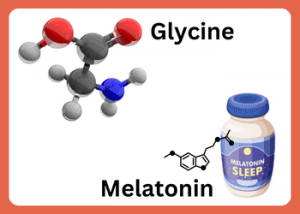Many people struggle with sleep issues and turn to sleep aids or medications for relief, but these options can come with unwanted side effects or risks. Glycine, an amino acid that is naturally found in the body and in some foods, has been studied for its potential to improve sleep quality and quantity without these downsides.
As a natural solution to sleepless nights, glycine may be a safe and effective option for those looking to enhance their sleep experience. In this article, we’ll explore the benefits, risks, and best practices for using glycine for sleep support.
Table of Contents
Benefits of Glycine for Sleep
Glycine has been extensively researched for its potential to bolster sleep quality and duration.
| Benefit | Description |
|---|---|
| Improved sleep quality | Glycine has been shown to improve subjective sleep quality, as reported by study participants. This includes improvements in sleep satisfaction, sleep ease, and overall sleep quality. [1][2] |
| Reduced sleep latency | Glycine has been found to reduce the amount of time it takes to fall asleep, also known as sleep onset latency. [1][2][3] |
| Increased sleep efficiency | Glycine has been shown to improve sleep efficiency, which is the amount of time spent asleep relative to the amount of time spent in bed. This means that glycine may help people get more restful sleep with fewer awakenings during the night. [2][4] |
| Improved daytime functioning | Glycine supplementation has been found to improve cognitive performance and reduce daytime sleepiness in people with poor sleep quality. [5][6] |
| Lack of tolerance | Unlike some sleep medications, glycine does not appear to lead to tolerance or withdrawal effects over time. [2] |
It is essential to be aware that everyone may have a different reaction to glycine, and more research is necessary for us to fully comprehend the advantages of using glycine as a sleep aid.
Insomnia not only disturbs your sleep but also decreases your overall quality of life. A study from some time ago examined glycine’s effect on daytime drowsiness and fatigue, which is a common symptom for people experiencing insomnia. It was found that taking glycine increased their sleep quality regardless if they had mild or occasional sleeping issues.
Before you start consuming any type of supplement, it’s smart to consult with your healthcare provider first.
What are the Risks, and Side Effects of Taking Glycine?
Glycine is generally considered safe and well-tolerated, with few side effects reported in studies. However, like any supplement, there are some potential risks and side effects to be aware of.
Here are some specific glycine for sleep side effects to consider:
- Gastrointestinal symptoms: High doses of glycine may cause mild gastrointestinal symptoms such as nausea, bloating, or diarrhea. These symptoms are typically mild and go away quickly.
- Hypoglycemia: Glycine has been shown to lower blood sugar levels in some people. This can be a concern for people with diabetes or hypoglycemia, and they should monitor their blood sugar levels carefully if using glycine.
- Interactions with medications: Glycine is not known to interact with any medications, but it’s always important to check with a healthcare provider before starting any new supplement regimen, especially if taking medication.
- Safety during pregnancy and breastfeeding: The safety of glycine during pregnancy and breastfeeding is not well-established, and it’s best to avoid using glycine during these times.
- Neurological effects: There is some evidence that high doses of glycine may have a paradoxical effect on the nervous system, causing overstimulation and leading to neurological symptoms such as tremors, twitching, or seizures. However, this is rare and typically only seen in high doses.
It’s important to note that individual responses to glycine may vary, and some people may experience side effects that are not mentioned here. As with any supplement, it’s always a good idea to talk to a healthcare provider before starting to use glycine.
How to Use and Dosages
For those looking to gain sleep support, the recommended dosage for glycine supplement is anywhere from 3-5 grams taken 30 minutes prior to bedtime.
If you’re hoping to benefit from its cognitive function qualities, studies have shown that 1 – 2 grams are adequate. However, please keep in mind that individual responses may differ based on several factors; therefore it’s always best practice to consult a healthcare provider before introducing any new supplement into your daily routine.
Glycine vs Melatonin
Research has demonstrated that glycine and melatonin have the capability to improve sleep quality.
Mechanism of Action:
- The pineal gland naturally produces the hormone melatonin in response to darkness, allowing it to regulate our body’s circadian rhythms. By supplementing with this helpful substance, we can increase our levels of melatonin; potentially providing us with greater energy and improved sleep/wake cycles.
- Glycine, an amino acid that calms the mind, amplifies serotonin levels in order to maintain more balanced emotions and a better night’s rest. Serotonin is a neurotransmitter responsible for regulating our mental well-being and sleep cycles.
 Effectiveness for Sleep:
Effectiveness for Sleep:
- Clinical studies have revealed that Melatonin not only accelerates the time it takes to drift off peacefully but also enhances sleep quality and length.
- While the evidence for glycine is not as strong as that of melatonin, it has been suggested to help improve sleep quality and even reduce the amount of time needed to drift off into dreamland.
Dosage and Timing:
- It’s best to determine your specific melatonin dosage based on your age, weight, and sleep requirements. Usually, it will range from 0.3 to 5 mg taken before going to bed for 30-60 minutes.
- The ideal dosage of Glycine for individuals depends on their weight and typically ranges from 3 to 5 grams. For optimal results, it should be taken 30 minutes prior to bedtime.
Side Effects:
- Although some mild side effects, such as dizziness, nausea, and headaches may occur with the use of melatonin supplements, these symptoms typically dissipate quickly. To avoid drowsiness during the daytime hours, however, it is important to keep doses at a moderate level and not take them for too long.
- Despite being generally safe and well-tolerated, a few individuals may experience fleeting gastrointestinal issues such as queasiness, bloating, or diarrhea when taking glycine.
Interactions:
- Melatonin has the potential to interact with various medications, including blood thinners, immunosuppressants, and antidepressants. Additionally, it may also have an adverse effect when taken alongside alcohol or caffeine.
- Although Glycine is generally safe and does not usually interact with any medications, it is always advisable to speak with your healthcare provider before beginning a new supplement.
In conclusion, both glycine and melatonin have been researched for their aptitude to better sleep. Despite the fact that they operate through distinct approaches, along with having prescribed doses and timing instructions which differ from one another.
If you’d rather take a more organic route for sleep support or experience negative effects from melatonin, glycine might be the answer.
However, as with any supplement, it’s essential to confer with your healthcare provider prior to taking either one of these supplements. Although there is substantial proof behind the effectiveness of melatonin over glycine, both are still viable alternatives and may have desirable results – if taken properly.
Who Should Not Take Glycine?
Individuals with certain medical conditions or those taking specific medications should exercise caution or avoid taking glycine supplements without consulting a healthcare professional.
Firstly, individuals with kidney or liver impairment should approach glycine supplementation with caution. Glycine is primarily metabolized in the liver and eliminated via the kidneys. In cases of compromised kidney or liver function, the clearance of glycine from the body may be impaired, potentially leading to increased glycine levels and adverse effects.
Moreover, individuals with a history of schizophrenia or other psychiatric disorders should avoid glycine supplementation without medical supervision. Glycine acts as a co-agonist of the N-methyl-D-aspartate (NMDA) receptor, which is involved in glutamatergic neurotransmission. While some research suggests that glycine supplementation may have therapeutic effects in certain psychiatric conditions, including schizophrenia, the safety and efficacy of glycine supplementation in these populations require further investigation.
Furthermore, individuals with hypersensitivity or allergies to glycine or related compounds should not take glycine supplements. Allergic reactions to glycine are rare but can occur in susceptible individuals, leading to symptoms such as rash, itching, swelling, or difficulty breathing. It is essential for individuals with known allergies to glycine to avoid its use and seek alternative supplements.
Additionally, individuals taking medications that affect glycine metabolism or neurotransmission should consult their healthcare provider before using glycine supplements. Certain medications, such as antipsychotics, antidepressants, and antiepileptic drugs, may interact with glycine or modulate its effects on neurotransmitter systems. Adjustments to medication dosages or glycine supplementation may be necessary to avoid adverse interactions or effects.
Overall, individuals with kidney or liver impairment, a history of psychiatric disorders, hypersensitivity to glycine, or those taking medications affecting glycine metabolism or neurotransmission should exercise caution or avoid glycine supplementation without medical guidance. Consulting a healthcare professional before starting any new supplement regimen is advisable to ensure safety and appropriateness based on individual health status and medical history.
Frequently Asked Questions
Does Glycine Really Help Sleep?
Exciting research results have recently been uncovered – a study involving two groups, one given glycine before bed and the other being provided with a placebo. Surprisingly, those who ingested glycine achieved slow-wave sleep faster than their counterparts.
This indicates that consuming glycine aids in more quickly reaching deep sleep while also stabilizing your sleeping patterns for higher-quality rest.
How Long Before Bed Should I Take Glycine?
To ensure that glycine can reach your brain in the most effective way, it should be consumed 30 minutes before you hit the sack. Take half an hour to an hour beforehand for optimal results.
Is Glycine or GABA Better for Sleep?
Essential amino acids GABA and glycine provide countless benefits to your body. Glycine helps you form both creatine and collagen, whilst also playing a role in aiding people’s sleeping habits. On the other hand, GABA mainly works as an effective neurotransmitter that keeps the activities of your nervous system regulated and balanced.
 How Long Does it Take Glycine to Work for Sleep?
How Long Does it Take Glycine to Work for Sleep?
Glycine may start to work for sleep within 30 minutes to an hour after ingestion, although it may take several days of consistent use to see full benefits. It’s important to note that individual results may vary.
What Does Dr. Huberman Recommend for Sleep?
If you’re among the many individuals who suffer from insomnia, consider giving Andrew Huberman’s Sleep Cocktail a try.
This concoction is composed of magnesium and glycine for sleep, theanine, and apigenin which work wonders in helping with restlessness.
For those looking to enhance their sexual prowess or testosterone levels, Tongkat Ali and Fadogia Agrestis are natural solutions that have been clinically proven to yield satisfactory results.
Conclusion
In conclusion, glycine may offer a natural solution for those who struggle with sleep issues. As a supplement, glycine has been found to improve sleep quality, reduce the amount of time it takes to fall asleep, and increase sleep efficiency. Additionally, glycine does not appear to lead to tolerance or withdrawal effects over time, making it a safer option for those who seek to improve their sleep experience.
It’s important to note that individual responses to glycine may vary, and more research is needed to fully understand its benefits and potential side effects. As with any supplement, it’s always a good idea to talk to a healthcare provider before starting to use glycine for sleep support. Overall, glycine is a promising option for those seeking a natural approach to getting better sleep.
References:
- Bannai, M., Kawai, N., Ono, K., Nakahara, K., & Murakami, N. (2012). The effects of glycine on subjective daytime performance in partially sleep-restricted healthy volunteers. Frontiers in neurology, 3, 61.
- Inagawa, K., Hiraoka, T., Kohda, T., Yamadera, W., & Takahashi, M. (2006). Subjective effects of glycine ingestion before bedtime on sleep quality. Sleep and biological rhythms, 4(1), 75-77.
- Yamadera, W., Inagawa, K., Chiba, S., Bannai, M., Takahashi, M., & Nakayama, K. (2007). Glycine ingestion improves subjective sleep quality in human volunteers, correlating with polysomnographic changes. Sleep and biological rhythms, 5(2), 126-131.
- Bannai, M., Kawai, N., Ono, K., Nakahara, K., & Murakami, N. (2011). The effects of glycine on subjective sleep quality and sleep quantity in human volunteers, and its antipsychotic action on psychotic patients. Sleep and Biological Rhythms, 9(2), 133-141.
- Kawai, N., Sakai, N., Okuro, M., Karakawa, S., Tsuneyoshi, Y., Kawasaki, N., … & Nishino, S. (2015). The sleep-promoting and hypothermic effects of glycine are mediated by NMDA receptors in the suprachiasmatic nucleus. Neuropsychopharmacology, 40(6), 1405-1416.
- Inagawa, K., Hiraoka, T., Kohda, T., Yamadera, W., & Takahashi, M. (2006). Sleep-promoting effects of glycine ingestion. The American journal of the medical sciences, 331(5), 245-248.

 How Long Does it Take Glycine to Work for Sleep?
How Long Does it Take Glycine to Work for Sleep?